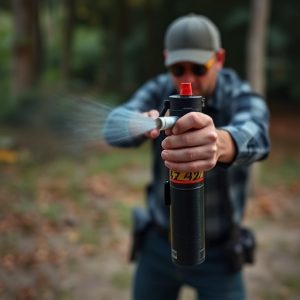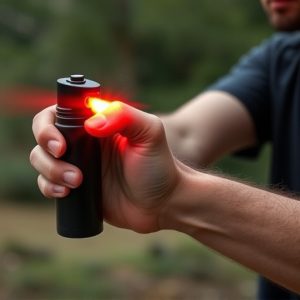Protecting Pets: Pepper Spray Exposure Treatment & Aftercare
Pets can suffer from pepper spray exposure, leading to eye and respiratory irritation. Immediate act…….
Pets can suffer from pepper spray exposure, leading to eye and respiratory irritation. Immediate action is vital: rinse affected areas with water for 15+ minutes and seek veterinary assistance if irritation continues. Regular grooming and controlled exposure to defensive spray prepare pets and prevent fear associations. After an incident, gently rinse their eyes/face/paws, create a calm environment, and consult a vet for personalized treatment advice to ensure their recovery.
Defensive spray, often known as pepper spray, offers civilian protection against potential threats. While primarily designed for law enforcement, its use by civilians has gained popularity for personal safety. However, treating pets exposed to pepper spray is a critical consideration. This article delves into understanding the effects of pepper spray on pets, preparing your pet for potential exposure, and providing aftercare for affected animals, ensuring their well-being in these challenging situations.
- Understanding Pepper Spray and Its Effects on Pets
- Preparing Your Pet for Potential Exposure
- Aftercare and Support for Exposed Pets
Understanding Pepper Spray and Its Effects on Pets
Pepper spray, a popular self-defense tool for civilians, can inadvertently affect pets if they come into contact with it. Understanding its effects on animals is crucial when considering its use in civilian protection scenarios. When pepper spray comes into direct contact with a pet’s eyes or respiratory system, it can cause severe irritation and distress. These symptoms may include teary eyes, coughing, difficulty breathing, and temporary blindness, which can be particularly concerning for smaller pets like cats and dogs.
Treating pets exposed to pepper spray requires immediate action. Rinse the affected area thoroughly with water, ensuring that any remaining spray is washed away. Seek veterinary assistance if irritation persists or deepens. The vet may administer additional treatments, such as antihistamines or eye drops, to alleviate symptoms and ensure your pet’s well-being. Remember, while pepper spray can be a valuable tool for personal safety, it should be used responsibly and with caution around pets and other non-target individuals.
Preparing Your Pet for Potential Exposure
When considering defensive spray for civilian protection, it’s crucial to prepare your pet for potential exposure as well. Unlike humans, pets can’t communicate their discomfort or fear effectively, making it essential to take proactive steps. Regularly grooming and exercising your pet helps build a strong bond and makes them more responsive during stressful situations. Additionally, familiarize them with the sound and scent of the spray by gently applying a diluted version in controlled environments, ensuring they don’t associate it solely with fear or aggression.
Treating pets exposed to pepper spray requires swift action. If your pet comes into contact with the spray, immediately rinse their face, eyes, and paws with copious amounts of water for at least 15 minutes. Seek veterinary care if irritation persists or if your pet exhibits unusual behavior such as excessive panting, vomiting, or difficulty breathing. Remember, preparing your pet not only enhances their safety but also strengthens the family bond during unexpected situations.
Aftercare and Support for Exposed Pets
After a civilian protection event involving defensive spray, it’s crucial to consider the well-being of pets that may have been exposed. Pepper spray, while effective for personal defense, can cause irritation and discomfort in animals, much like humans. Treating pets exposed to pepper spray involves immediate and careful attention. Rinse the eyes gently with warm water for at least 15 minutes to flush out any residual spray, ensuring the pet is comfortable during this process.
Additionally, dress the affected areas with a calm and soothing environment. Avoid intense lights or sounds that could further agitate the animal. Contact a veterinarian promptly for professional advice tailored to your pet’s specific condition. They can offer guidance on any necessary medications or treatments to alleviate discomfort and ensure the speedy recovery of pets exposed to pepper spray.
Pepper spray, while a valuable tool for civilian protection, can have severe effects on pets if exposed. Understanding its impact, preparing your pet for potential encounters, and providing proper aftercare are essential steps in ensuring their safety. By following these guidelines and seeking veterinary assistance when needed, you can effectively treat and support your pet if they experience exposure to pepper spray.


